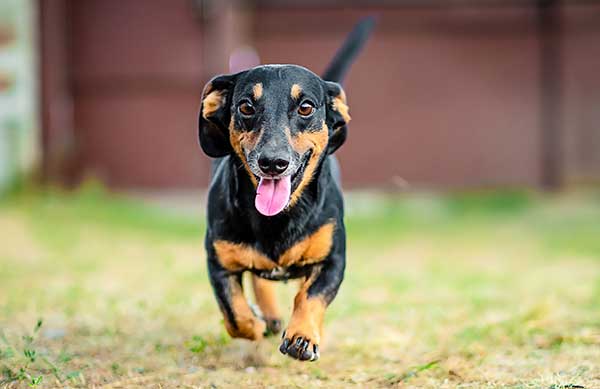Bringing a new dog home can feel like welcoming an extra ray of sunshine on a cold winter morning. However, if the new addition to the family turns out to be so hostile that he doesn’t get along with anyone, then your excitement could quickly turn into a nightmare. And the situation can only get worse if the dog happens to be from a naturally aggressive breed, such as the Dachshund.
But just why do Dachshunds have a tendency for becoming suddenly aggressive?
Numerous factors can predispose Dachshunds to aggression. These range from their powerful hunting instincts to territoriality, anxiety, fear, boredom, and anything in between.
Therefore, the best way to deal with the problem is to identify its root cause. More on that later on.
Let’s start by familiarizing ourselves with Dachshunds and why this dog breed is considered naturally hostile.
Table of Contents
More About Dachshunds
The Dachshund is a small-to-medium short-legged, long-bodied hound-type dog breed that originated in Germany. The breed goes by many nicknames, including badger dog, wiener dog, and sausage dog.
Dachshunds are classified as hunting dogs. The breed was developed primarily to scent, chase, and flush out badgers. That pretty much explains its ‘badger dog’ nickname.
In addition to hunting badger dogs, Dachshunds were also useful in flushing other burrowing animals, such as rabbits.
Dachshund Quick Facts
| Official Name: | The Dachshund |
| Nicknames: | Badger Dog, Sausage Dog, and Wiener Dog |
| Type: | Hunting Dog |
| Country of Origin: | Germany |
| Specialties: | Scenting, Chasing, and Flushing |
| Varieties Based on Hair Type: | Smooth-haired, Long-haired, and Wire-haired |
| Varieties Based On Size: | Standard, Miniature, and Rabbit |
| Average Size: | Standard: 37 to 47 cm (15 to 19 in) for dogs and 35 to 45 cm (14 to 18 in) for bitches Miniature: 32 to 37 cm (13 to 15 in) for dogs and 30 to 35 cm (12 to 14 in) for bitches Rabbit: 27 to 32 cm (11 to 13 in) for dogs and 25 to 30 cm (9.8 to 11.8 in) for bitches |
| Color: | Solid Red, Red & Tan, Black & Tan, and Merle or Brindle |
| Coat Characteristics: | Short, Long, or Wire-haired |
| Body Shape: | Long, Narrow, and Reasonably Build |
| Personality: | Boisterous, Eager to Please, and Strong Predatory Instincts |
| Common Health Problems: | Intervertebral Disk Disease (IDDD), Obesity, Hip Dysplasia, Elbow Dysplasia, Vision Problems, and Congenital Defects |
| Average Lifespan: | 12 to 16 Years |
| Year Recognized by the American Kennel Club (AKC): | 1885 |
| Popularity: | Ranked the 12th most popular dog breed in the United States by the AKC |
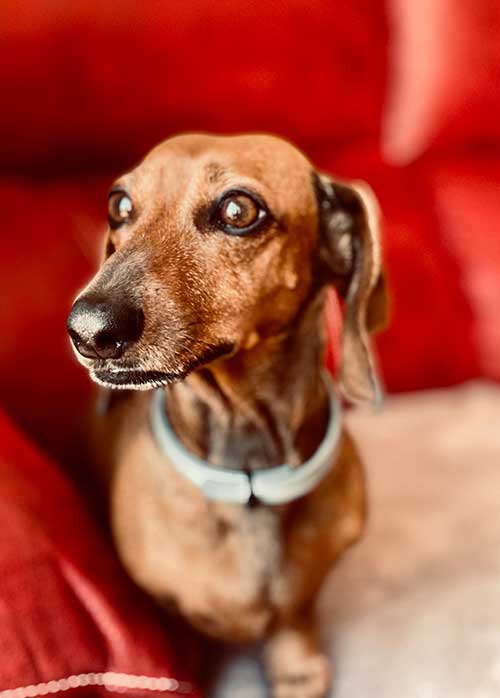
Types of Dachshunds
There are three main types of Dachshund dogs, depending on the breed’s hair type. They include;
- Smooth-haired Dachshunds
- Long-haired Dachshunds
- Wire-haired Dachshunds
Dachshunds may also be classified based on their size. In this respect, we have Standard Dachshunds, Miniature Dachshunds, and Rabbit Dachshunds.
Physical Characteristics
The Dachshund is a small-to-medium dog breed that ranges in size depending on the type.
Male standard Dachshunds measure 37 to 47 centimeters or 15 to 19 inches at the withers while females measure 35 to 45 centimeters or 14 to 18 inches.
Male miniature Dachshunds measure 32 to 37 cm (13 to 15 in) while females measure 30 to 35 cm (12 to 14 in).
Lastly, male rabbit Dachshunds measure 27 to 32 cm (11 to 13 in) while females measure 25 to 30 cm (9.8 to 11.8 in).
In addition to their different sizes, Dachshunds also stand out for their distinct appearance. The breed sports a long, narrow body that resembles the sausage. This explains why they’re informally known as ‘sausage’ or ‘wiener’ dogs.
Dachshunds have a relatively compact body and athletic appearance. This is understandable considering the important role that the dog was originally bred for – hunting.
Most Dachshunds come in four main colors. They include solid red, red & tan, black & tan, and merle or brindle. The breed’s coat can be short, long, or wire-haired.
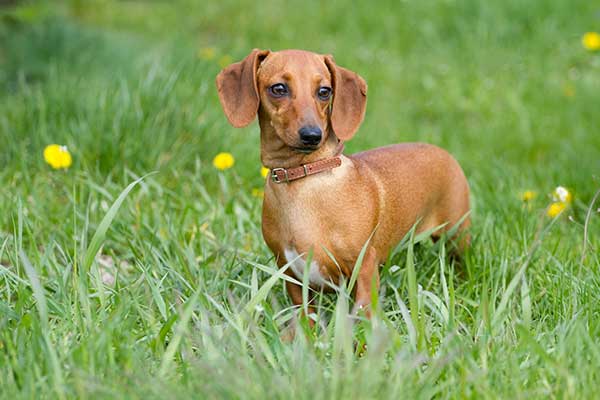
Are Dachshunds Normally Aggressive?
The Dachshund is one of the most aggressive dog breeds. The breed tends to be more hostile if not properly trained and socialized.
So, it’s not unusual to be chilling out with your Dachshund at the dog park and suddenly realize that the animal displays some hostility towards other dogs. This might get you asking, ‘why is my Dachshund suddenly aggressive at dog park?’
As we already pointed out at the beginning (and as you’re about to find out), numerous factors are responsible for Dachshund aggression. But before we explore those reasons, it’s important to start by familiarizing yourself with the Dachshund’s temperament and personality.
Dachshunds are energy-filled and highly playful dogs, which potentially makes them suited for families with kids and other pets. The breed is also known to be attention-seeking and eager to please.
But as a hunting dog, Dachshunds have a natural propensity for chasing anything that moves. These include birds, tennis balls, and other household pets. Dachshunds may not be endowed with the longest legs in the canine world. But they make up for that limitation with their sheer ferocity and tenacity.
When a Dachshund’s predatory instincts kick in, he will not stop until the prey is either nailed or flees out of sight. This trait may qualify Dachshunds as the perfect hunting dog. But it also makes it difficult for these dogs to share the same living space with kids and other small pets.
Stubbornness is another notable drawback to owning a Dachshund. Again, this has to do with the breed’s powerful hunting instincts. Note that obstinate dogs are particularly difficult to train and socialize.
But despite all their shortcomings, Dachshunds are widely considered one of the most intelligent dog breeds. Studies have shown that the breed has a persistent ability to follow trained commands up to 50% of the time or even more.
- 【Dog Training Mat Toys】: Wondering how to play hide and seek with your pup? How about a snuffle mat that lets them sniff and search for hidden...
- 【Safe & Unique Design】: The Dog Feeding Mat is made of high-quality fabric with thick artificial grass blades, durable and pet-friendly. Petals...
- 【Non-slip & Portable】: The bottom design is a non-slip cloth that effectively holds the mat and prevents the dog from moving the mat. Tie the rope...
Last update on 2025-01-03 / Affiliate links / Images from Amazon Product Advertising API
Why Is My Dachshund So Aggressive?
Below are common factors that could make your Dachshund suddenly aggressive and biting;
1. Hunting Instincts
Dachshunds were primarily bred for hunting. Like most hunting dogs, the Dachshund has high predatory instincts and will not hesitate to give chase to anything that moves. It’s those very instincts that make Dachshunds considerably more aggressive than many dog breeds.
2. Small Size
The Dachshund is a small breed. Interestingly, these dogs tend to see themselves bigger than they actually are.
This impaired sense of size isn’t unique to Dachshunds. It’s also observable in many other smaller breeds, such as the Chihuahuas.
Although Dachshunds may not always cause fatal attacks, they can easily bite or bark when they feel provoked.
3. Mistrust
Dachshunds that do not receive kind treatment from their owners will most certainly display some hostility. Aggression is the dog’s way of showing that he can inflict nasty injuries if messed up with.
Mistrust is also the most common reason behind the Dachshund’s aggression toward strangers and other unfamiliar animals.
4. Domineering Behavior
One reason your Dachshund could be displaying aggression towards you is that the animal feels aggrieved with how you’ve recently treated him. However, hostility could also be a sign that your Dachshund lacks discipline and has assumed dominance over you.
Note that it’s very dangerous when a dog begins to place himself higher than his owner in the family pecking order. Prompt training is usually necessary in setting the record straight.
5. Territoriality and Resource Guarding
Dachshunds are highly territorial. These dogs have a propensity for guarding anything in their patch that they claim to.
Don’t be surprised if your Dachshund growls when you or someone else approaches his toys or feeding bowls. The dog may also demonstrate hostility towards anyone they think is a threat to their owners.
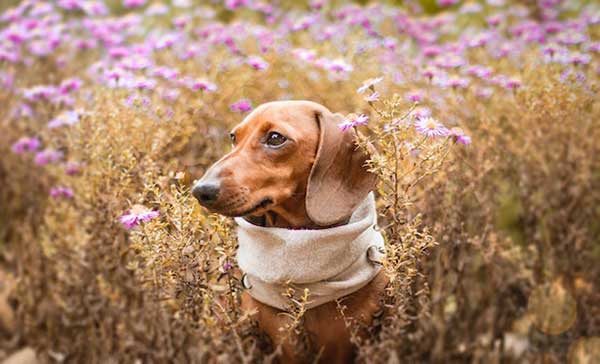
6. Pain
A dog in pain will behave aggressively towards anyone, including his owner. And the Dachshund is not an exception. However, what looks like sheer hostility is simply the animal’s way of protecting himself from further harm.
When pain is the primary cause of aggression, you may also observe other symptoms like oversleeping, inappetence, and limping.
7. Fear
When a dog feels threatened, his options are usually limited to fleeing the scene or confronting the assailant.
Dachshunds are incredibly courageous and will mostly go on the offensive than back down from the threat.
Common fear factors include confrontation by other people or dogs that are much larger, persistent invasion of personal space, sudden routine changes, and environmental factors like lightning and thunderstorm.
The following are signs that your Dachshund feels threatened;
- Running away and hiding
- Displaying the white section of their eyes
- Licking their lips
- Baring their teeth
- Yawning
- Stiffening their bodies
- Anxiety
If you own a Dachshund but also happen to be a career parent who leaves early in the morning and returns late in the evening, you may start to notice that your pooch displays some aggression whenever you’re about to leave for work. That might get you wondering, why is my Dachshund getting aggressive whenever I’m leaving the house?
Well, there’s one major reason that can make your dachshund suddenly aggressive in the morning – the dog is suffering from separation anxiety.
Separation anxiety is a severe disorder common in dogs that spend much of their time alone without sufficient stimulation. Without prompt interventions, the condition can easily degenerate into unmanageable levels.
Tell-tale signs of separation anxiety in Dachshunds include;
- Intense anxiety whenever you’re about to leave the house
- Overexcitement when you return home
- Destructive habits, such as excessive chewing and digging
- Nuisance barking or growling
- Bad potty habits, such as pooping in undesired places
- Poor eating habits, such as overeating or undereating
- Sleep disorders, such as oversleeping or undersleeping
8. Boredom
Boredom usually goes hand in hand with separation anxiety, only that it’s not a specific medical problem. Still, a bored Dachshund may display some aggression.
9. Maternal Instincts
A female Dachshund who has just given birth may behave aggressively to protect her puppies.
In this case, the aggression is totally attributable to maternal instincts and the dog should get over it once her puppies are fully grown.
Needless to mention, certain medical conditions might also make a dachshund suddenly aggressive toward other dogs or even people. These are mainly diseases that produce pain and inflammation, such as osteoarthritis and osteosarcoma. Others include illnesses that affect your dog’s central nervous and endocrine systems.
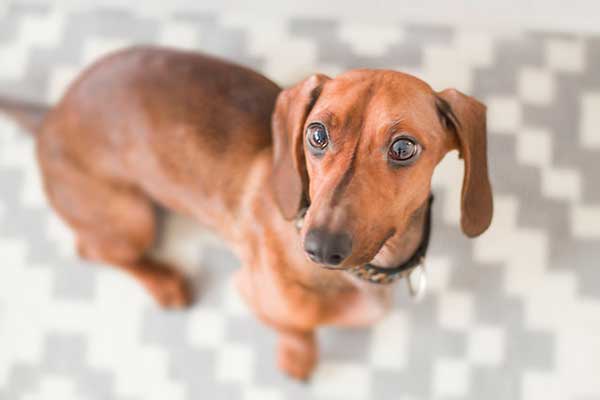
How Do I Stop My Dachshund From Being Aggressive
Now that we’ve explored the various reasons behind Dachshund aggression, you’re probably now wondering what to do with an aggressive Dachshund.
The first step in dealing with hostility in Dachshunds is to identify the root cause of the problem. That entails understanding when the behavior first started and when it’s most intense.
For instance, if your Dachshund is suddenly anxious and aggressive whenever you’re about to leave for work, the dog could be suffering from separation anxiety. The most effective remedy here would be to provide the animal with enough toys to keep him occupied during your absence.
You could also consider hiring a pet sitter or professional pet trainer. And whenever you’re home, ensure you spend quality time playing with or exercising your dog. These interventions will not only address separation anxiety in Dachshunds. They may also be effective in fighting boredom, fear, and other emotional problems.
If it’s proving difficult to diagnose your Dachshund’s aggression, the only option is to whisk the dog to the vet. A professional examination may uncover certain underlying conditions responsible for the dog’s aggressive behavior.
The following are other tips you might explore to deal with aggression in Dachshunds;
1. Training
One of the frequently asked questions by Dachshund owners is, ‘my Dachshund is getting aggressive, can I train him to become better?’
You sure can.
Despite their predisposition towards aggression, Dachshunds are some of the easiest dog breeds to train. That’s mainly due to their relatively high intelligence quotient (IQ).
The best way to train your Dachshund is to start by getting the dog to master some basic commands, such as ‘SIT,’ ‘STOP,’ and ‘STAY.’
Experts also recommend positive reinforcement, where you reward the dog for good behavior as opposed to punishing him for bad ones. And when it comes to the actual training, select a neutral ground and one that contains minimal distractions.
2. Socialization
Training mostly works for new dogs that joined the family when already grown. On the other hand, socialization is most effective for puppies who’re yet to learn unbecoming behaviors.
It’s best to socialize your Dachshunds as soon as they’re weaned. Common ways to socialize puppies include hanging out together in social groupings, visiting the dog park regularly, playing together, and going on joint morning runs in the neighborhood. These strategies can help familiarize a Dachshund with other people without the dog becoming too aggressive.
3. Neutering and Spaying
Neutering and spaying might also play a role in reducing aggression in Dachshunds.
However, note that many other factors could make your Dachshund suddenly aggressive after being spayed or neutered. That’s because these interventions mainly work for aggression induced by hormonal issues.
Remember to visit your vet if the problem persists despite implementing the above tips.
Conclusion
The mere fact that Dachshunds are predisposed to aggression doesn’t necessarily mean every one of them will be naturally hostile. Neither does it imply that genetics is the only reason these dogs may become aggressive.
Therefore, it’s imperative to familiarize yourself with a Dachshund’s personality and temperament before adopting him. And if you’re welcoming these dogs as part of the family litter, ensure they receive adequate training and socialization early in their life.
- FORMULATED FOR PUREBRED DACHSHUNDS: Royal Canin Dachshund Adult Dry Dog Food is designed to meet the nutritional needs of purebred Dachshunds 10...
- SPECIALIZED KIBBLE: Unique kibble shape helps Dachshunds pick up and chew their food
- BONE AND JOINT: Calcium and phosphorus provide joint and bone support to help aid a small dog’s tiny limbs and a long backbone
Last update on 2025-01-17 / Affiliate links / Images from Amazon Product Advertising API
Checkout Our Favorite Dog Products
1. BEST PUPPY TOY
We Like: Snuggle Behavior Toy with Heart Beat & Heat Pack – Ideal toy for new puppies.
2. BEST DOG TRAINING PROGRAM
We Like: Doggy Dan The Online Dog Trainer – Stop any dog problem and raise the perfect puppy with The Online Dog Trainer.
3. BEST DOG PUZZLE TOY
We Like: Outward Hound Interactive Puzzle Toy – Every dog loves chasing squirrels at the park. The Outward Hound Hide-a-Squirrel Puzzle Toy gives your dog the same feeling as though he was outdoors chasing live squirrels.
4. Best Bone Broth for Dogs
We Like: (Solid Gold – Human Grade Bone Broth for Dogs) – Simmered Beef Bone Broth With Turmeric Provides A Nutrient-Dense And Flavorful Addition To Your Dog’s Meal + Rich In Natural Collagen From Beef Bones.
5. Best Multivitamin for Dogs
We Like: PetHonesty 10-For-1 Multivitamin – 10 Benefits in 1 Daily Treat – These Multivitamin Snacks combine a well-rounded blend of the most essential vitamins and supplements including glucosamine, probiotics, vitamins and omegas, for dogs’ overall daily health.

